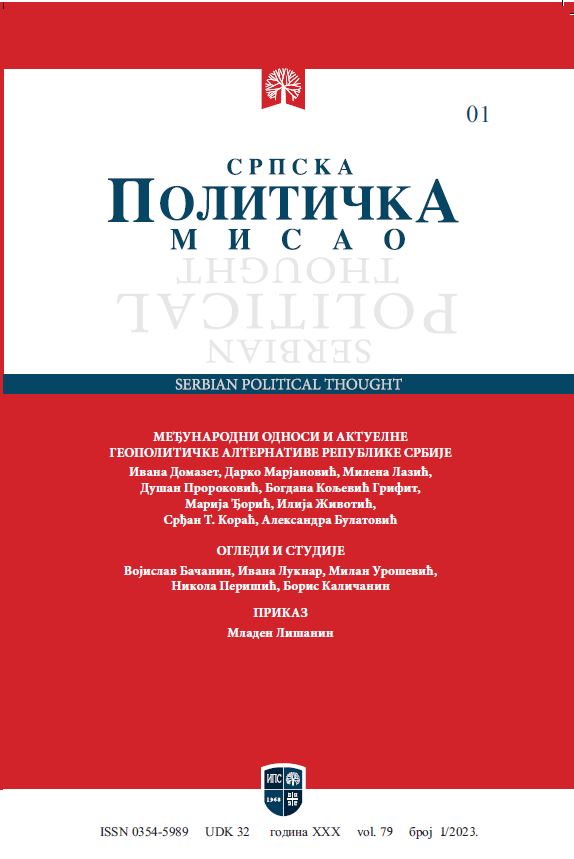LOCAL ELECTIONS IN THE REPUBLIC OF SERBIA 2016 AND 2020 - POLITICAL CONSEQUENCES OF LOWERING THE ELECTORAL THRESHOLD
Abstract
The paper examines the political consequences of the change in electoral legislation through a comparative analysis of election results at the local level in 2016 and 2020. In addition to the analysis of the election results themselves, and bearing in mind the boycott of the majority of the opposition in the 2020 elections, the paper will also show a simulation of the election results of 2016 with a reduced electoral threshold of 3% in order to better understand the effect of lowering the electoral threshold, considering that at that time all relevant political parties participated in local elections. The electoral results from cities that are the seat of administrative districts (24) in the Republic of Serbia, excluding the city of Belgrade and Kosovo and Metohija, are used as a sample for the analysis. The main findings of the research show that the lowering of the electoral threshold did not increase representativeness. More precisely, the number of lists represented in local parliaments did not increase, neither in absolute nor in effective numbers. However, the impact of the boycott of the opposition parties in the 2020 election process should be taken into account. On the other hand, the analysis shows that a larger number of lists would have crossed the electoral threshold if the three-percent electoral threshold had been applied in 2016. In addition, in 2020, a smaller number of so-called "wasted votes" was observed. Lastly, lowering the electoral threshold did not help the citizens groups to achieve better election results in 2020.
References
Закон о локалним изборима, „Службени гласник“, бр. 14/22
Јовановић, Милан и Никола Перишић. 2021. „Последице измена законоског изборног прага на представљеност странака националних мањина – локални избори у Србији 2020. године. “ Српска политичка мисао, 73, 79-101.
Матић, Петар. 2012. Редизајнирање локалне самоуправе: теоријски и упоредни оквир за модернизацију локалне самоуправе у Србији. Београд: Институт за политичке студије.
Посланичка група Српска напредна странка, Предлог Закона о изменама и допуни Закона о локалним изборима, бр.011-102, 21.1.2020.
Bursać, Dejan, and Dušan Vučićević. 2021. „Election boycott in a hybrid regime: The case of 2020 parliamentary elections in Serbia. “ New Perspectives 29, 2: 187-196.
Đukanović, Dragan. 2006. Electoral systems in the countries created in the territory of the former Yugoslavia. Međunarodni problemi, 58, 513-536.
Evans, Matt. 2010. „Electoral reform and political pluralism in local government. “ Party politics 16, 3: 394-413.
Farrell, David. 1997. Comparing Electoral Systems. Basingstoke: Palgrave Macmillan.
Hague, Rod, i Martin Harrop. 2014. Uporedna politika i vladavina. Beograd: Fakultet političkih nauka.
Jovanović, Milan. 2020. „Snižavanje izbornog praga - motivi i posledice. “ U Dijalog o izborima, ur. Dejan Milenković, 4–22. Beograd: Fakultet političkih nauka Univerziteta u Beogradu
Laakso, Maarku, and Rein Taagepera, R. 1979. „Effective“ number of parties: a measure with application to West Europe. Comparative political studies, 12(1), 3-27.
Nasković, Đorđe, 2020. „Predlog o smanjenju cenzusa zvanično u Skupštini, opozicija podeljena u ocenama“, Internet portal N1, pristupljeno 14.1.2023. https://n1info.rs/vesti/a562922-predlog-o-smanjenju-cenzusa-zvanicno-u-skupstini-opozicija-podeljena-u-ocenama/ .
Nastić, Maja. 2020. „Local elections in Serbia. A critical overview. “ Studia Wyborcze 30: 113-125.
Orlović, Slaviša. 2020. „Smanjenje izbornog praga – fragmentacija i bojkot izbora – polarizacija partijskog sistema Srbije.“ U Dijalog o izborima, ur. Milan Jovanović i Dejan Milenković, 29–43. Beograd: Fakultet političkih nauka Univerziteta u Beogradu.
Sartori, Giovanni. 1994. Comparative Constitutional Engineering - An Inquiry into Structures, Incentives and Outcomes. London: MacMillan Press.
Shepsle, K. 2006. Rational Choice Institutionalism. In R. Rhodes, S. Binder & B. Rockman (Eds.), The Oxford Handbook of Political Institutions, 23- 38. Oxford: Oxford University Press.
Venice Commission. 2010. „Report on thresholds and other features of electoral systems which bar parties from access to parliament (II). “ CDL-AD (2010) 7.
Venice Commission. 2018. „Compilation of Venice Commission opinions and reports concerning media and elections, “ CDL-PI(2018)006.
Vučićević, Dušan. 2020. „Reforme izbornog sistema Srbije: od „nema izmena u izbornoj godine” do „menjamo radi jačanja demokratije“ u samo nekoliko meseci. “ U Dijalog o izborima, ur. Milan Jovanović i Dejan Milenković, 89–197. Beograd: Fakultet političkih nauka Univerziteta u Beogradu.

